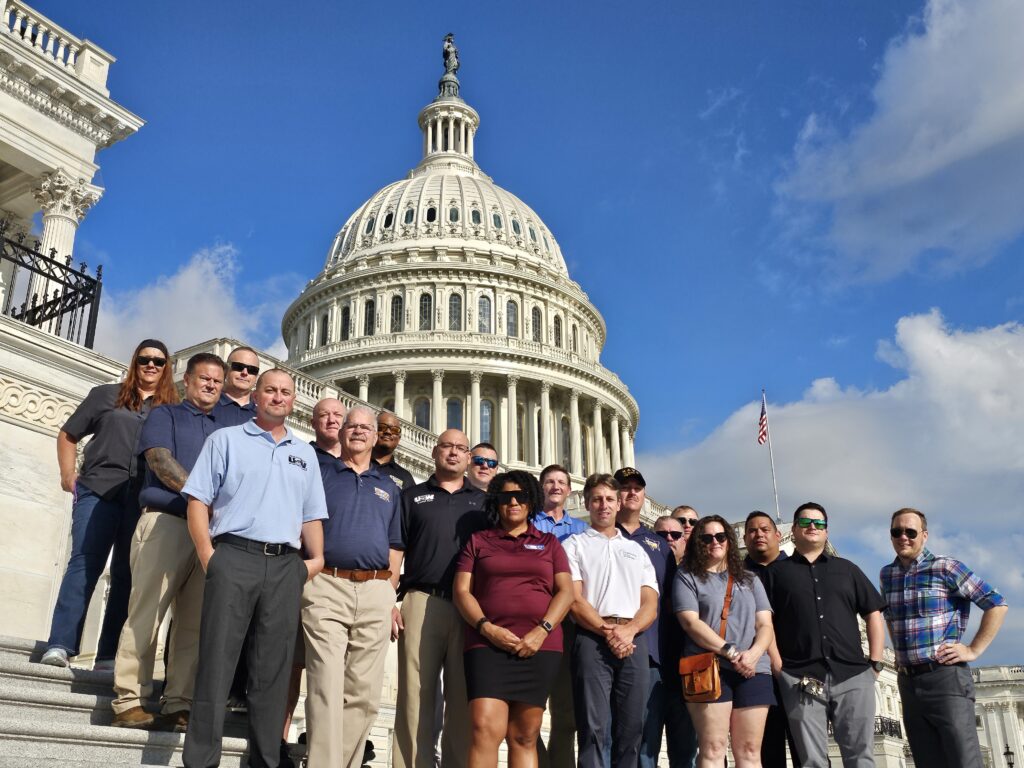Three-Year Pattern Agreement Advances National Oil Bargaining Achievements
Oil workers joined in solidarity to achieve a pattern agreement that adds to the list of accomplishments the USW’s National Oil Bargaining Program (NOBP) gained over its 54-year history.
The pattern for the next three years advances wages, health and safety, fatigue management and training. It strengthens the use of USW workers for routine, daily maintenance, maintains health care provisions, and continues no retrogression on contract items the union has gained over the years.
The pattern agreement began Feb. 1, 2019 and continues through Jan. 31, 2022. Beginning Feb. 1, 2019, hourly wages increased by 3.5 percent. Wages increase 3.5 percent the second year and 4 percent the third year. This is a total of an 11 percent raise over three years. The health insurance split remains 80-20 with workers paying 20 percent of the premiums.
No retrogression language is maintained for letters of agreement on layoff notice, plant closure, rate retention, national health insurance, health and safety, successorship and job security.
Process Safety Addressed System-wide
Process safety management (PSM) affects all refinery and chemical plant sites, no matter their size. This round of bargaining established a full-time healthy and safety (H&S) representative for refineries and chemical plants with less than 150 bargaining unit employees. This role combines the duties associated with process safety management and general health and safety.
If a site becomes part of the USW’s Triangle of Prevention (TOP) program, the PSM and H&S duties may be combined by mutual consent into the new TOP representative role.
The smaller refineries and chemical companies have 60 days from the date the contract is ratified to work with the local union to create and finalize the responsibilities and duties of the new combined role. The local submits candidates and both parties choose who will be the representative.
For the larger refineries and chemical plants that already have a PSM representative, a review of the unit size, number of employees and existing ability to handle PSM activities is mandatory. This review by the local union and management ensures each facility has the resources necessary to optimize employee involvement in PSM and add another PSM representative if it is determined the need exists.
Fatigue Management Improved
Being fatigued is like being drunk. It impairs a person’s judgment and causes them to make fatal errors. It can lead to horrific incidents that impact you, your coworkers and the surrounding community. That is why it is important for every unit at every facility to have a Fatigue Risk Management System (FRMS) and to create it with employee involvement. Plenty of help is available from the International.
While some locations have systems in place to address fatigue, others have not done so. These sites shall implement a FRMS that aims to meet the principles and intent of the American Petroleum Institute’s Recommend Practice 755 and includes provisions from the 2012 and 2015 NOBP letters of agreement. The union and the company have 90 days from contract ratification to develop such a program, and one year to implement it.
Participating in Training, Curriculum Development
To have a safe, efficient and productive facility, workers have to be up-to-date on technological advances, possess critical facility knowledge and have extensive experience. This requires training and development of appropriate curriculum.
Locally, management and the union shall select one operations and one maintenance representative who is knowledgeable about training in the oil and petrochemical industries. Either party can request a meeting. The representatives set a time and place to meet no later than 60 days from the original request, and have to meet at least quarterly to discuss training and curriculum development.
Doing Routine Maintenance
The letter of agreement on routine maintenance craft utilization solidifies our work to ensure USW workers handle routine maintenance. We understand our facilities better than any temporary contract worker. When equipment, technology and processes are introduced and modified at our refineries and chemical plants, skilled company employees doing routine maintenance work are essential to keeping our facilities safe, productive and efficient.
The union and management at each site will meet at least semi-annually to review items such as hiring plans for daily maintenance workers, use of contractors performing routine maintenance and identification of routine maintenance work that the company’s craft employees can do. Their first meeting must occur within 90 days of contract ratification.
Members wanting details about the 2019 NOBP pattern agreement can contact their local union officers.
By clicking Sign Up you're confirming that you agree with our Terms and Conditions.
Recent News Articles
Want to Learn More?
See how the USW is making a real difference in our communities and our workplaces.
